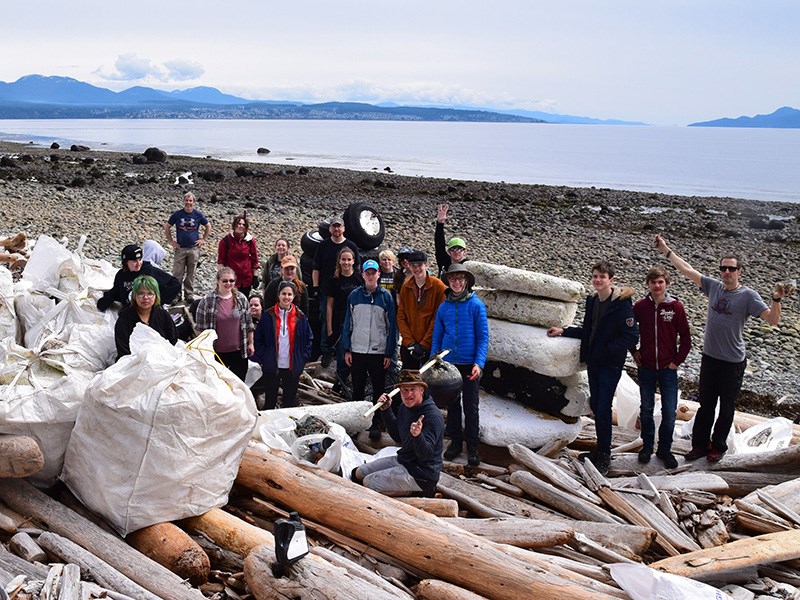A recent trip ashore on Texada Island revealed unexpected and worrying amounts of trash for commercial diver Sasha Van Kessel.
“I was out on my boat along the north end of Texada and ended up going to shore,” he said. “On this one beach the amount of styrofoam was just staggering.”
Van Kessel set about removing the debris on his own.
“I decided it couldn’t stay there,” he added.
Single-handedly, he collected 20 huge bags of trash.
“There were a lot of big pieces of styrofoam,” he said. “When it breaks down into those little tiny pieces it’s really hard to get it out of the environment at that point.”
This issue has been well documented in what are known as the ocean’s great garbage patches, enormous areas where tiny pieces of plastic converge, trapped by ocean currents.
Van Kessel enlisted the help of Powell River Regional District’s Let’s Talk Trash Team, which supports community members who organize beach cleanups throughout the region. Funding for these cleanups comes through a regional district application process.
Last year, three cleanups occurred and more are being planned for this year, according to Let’s Talk Trash Team member Abby McLennan.
“Texada, Harwood, Savary and Okeover Inlet are the four organized cleanups this year and then one will hopefully happen on the mainland,” she said.
On April 18 and 19 a group of some 65 youth, led by students from Coast Mountain Academy, joined the project traveling to Harwood Island to help tidy the beach.
Students from Brooks Secondary School were also involved and the experience provided opportunities for learning and mentorship as well as making an impact on the environment, according to Coast Mountain Academy program coordinator Ryan Barfoot.
“It’s a wonderful opportunity to take what we learn about in a theoretical context in the classroom and see on the news and apply it to the real world,” he said.
What struck students upon arrival on the uninhabited island was the volume of debris.
“The first day we went there everyone felt a bit overwhelmed,” said Solomon Rashleigh, 17. “It was a lot more than we were expecting.”
Much of the trash included personal items, according to Sofia Slatter, 17. This, she said, made participants mindful of changes they can make in their daily lives to leave less behind.
“There were a lot of lighters, bottles, plastic bags and a ton of straws,” said Slatter. “People definitely said they’re committing to using fewer bottles and not buying lighters when they don’t need to.”
The amount of styrofoam led students to question who ultimately should be paying for cleanups like this.
“It would be really powerful to take people in charge of distributing, manufacturing and paying for that styrofoam out here to see what they’re causing,” said Tyra Thulin, 17.
“I think they’d be surprised.”
These questions resonate strongly with McLennan.
“Right now taxpayers are paying for the cleanups and paying for what’s going to the dump or getting recycled,” she said. “It’s all coming from taxpayers who aren’t necessarily the people distributing that out into the environment.”
The regional district has teamed with nonprofit environmental conservation group Ocean Legacy Foundation for the recycling and upcycling of about 80 per cent of the material, said McLennan.
“Otherwise everything would just be going in the garbage,” she added.
According to Ocean Legacy, Canadians currently toss out almost three billion plastic bags each year. Much of it ends up in the ocean, where it causes serious harm to marine life. Large corporations are major contributors to single-use plastic pollution with items such as plastic straws, cups and bags.
A bill tabled by Courtenay-Alberni MP Gord Johns last year has called for a national strategy surrounding marine pollution and clean up. Bill M-151 came about partly in response to more than 2,000 large plastic aquaculture feed bags washing up on several beaches that are part of Pacific Rim National Park Reserve last November.
Over the course of the two-day cleanup, local students collected more than 30 large bags from just a small section of Harwood. The experience left them feeling hopeful that their involvement can make an impact, said Slatter.
“It makes you feel like you’re making a difference even if it’s a small difference,” she added.
Van Kessel said students should know their actions are how real change begins.
“It’s a big difference,” said Van Kessel. “It’s a lot of styrofoam that’s not going to be in the environment anymore. You guys should be really proud of yourselves.”
To become involved in or organize local beach cleanups email info@letstalktrash.ca or call 604.485.2260.



